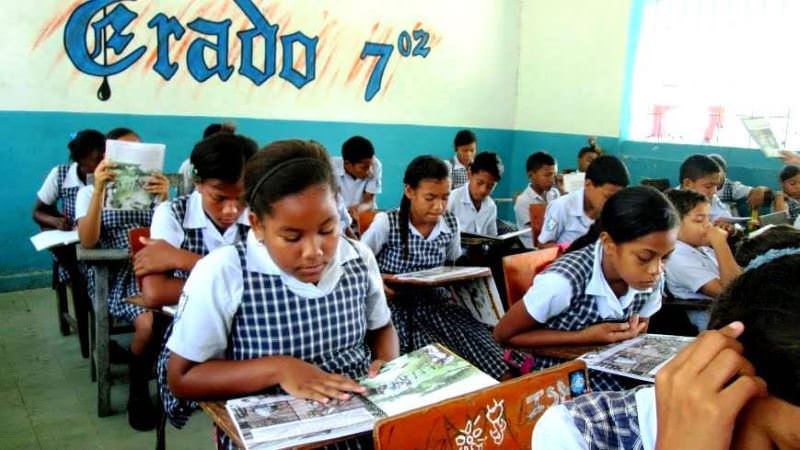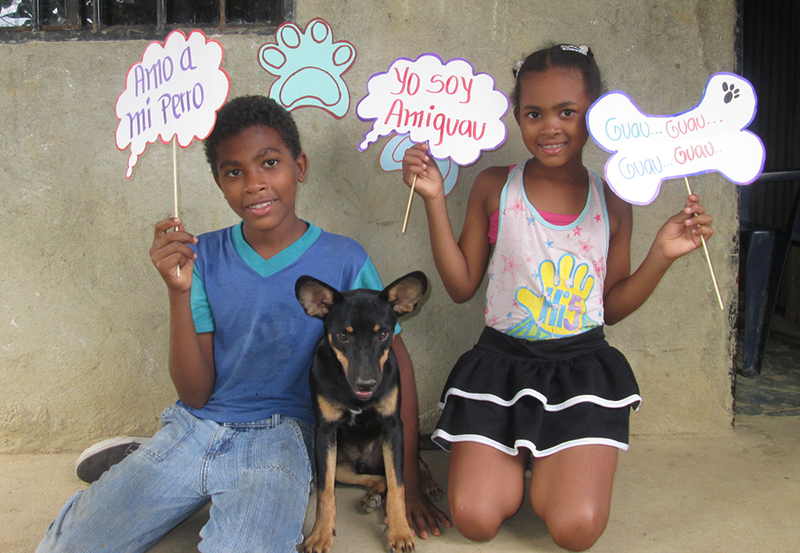
© Proyecto Tití
We are very proud of our efforts to engage children of all ages with opportunities to become involved in cotton-top tamarin conservation efforts. Our conservation education program focuses on children in elementary and secondary schools and teaches them about the threats facing cotton-tops and what they can do to help.
We focus our efforts in communities that live near forests where cotton-tops are found. These rural communities give us the opportunity to work on reducing threats to cotton-top tamarin survival and by engaging children in meaningful activities that increase knowledge and awareness about how they can make a difference in the future survival of cotton-tops and their forest home. We hope these lessons will result in life-long learning and actions to support the protection of cotton-top tamarins and the tropical dry forests of northern Colombia.
Since 2010, more than 10,000 students have participated in our education programs! The next generation is ready to take action to save cotton-top tamarins and their forests!
TITI KIDS
Titi Kids is a program that is targeted at elementary school children. In rural communities, it is common for children to live with a variety of domestic animals that are wild captured from the neighboring forests. Most children in rural communities do not understand the difference between wild and domestic animals, nor do they understand how their action of having wildlife as pets can impact the survival of species. Titi Kids teaches children the difference between domestic and wild animals and what animals make good pets for their home. Through a variety of classroom lessons, role playing, puppet shows, and interactive games, children learn about what happens when cotton-tops are kept as pets and commit to not having cotton-tops in their home.
AMIGUAU

Providing children with options is critical in helping them to change their behavior. If we don’t want children to have cotton-top tamarins as pets, what animals should they have as pets? Well, dogs are a great option given the number of dogs that are already found in rural communities. We created AMIGUAU (My Friend the Dog), a program that was designed to build a strong bond between children and dogs so that they would want to have a dog as a pet rather than a cotton-top. This program teaches children how to train some basic dog behaviors and how to care for their dog so that they develop a positive relationship between dog and their caregiver. Whether it is teaching a dog to “sit” or learning about the importance of providing clean water and a place to stay out of the sun, or making dog treats and toys, these children become very excited about their new relationship with their dog. What is even more exciting is how many of the children take dog training to the next level, inventing new behaviors to train or finding additional dogs in the neighborhood to teach.
As they learn about dog behavior, they also learn about cotton-tops and how their family in the forest provides everything they need to thrive. While children provide food and water for their dog, cotton-tops can forage for their own food in the forest, while children bath and pet their dog, cotton-tops groom one another in the forest and huddle together for comfort, while children teach their dog new tricks, cotton-tops learn what they need to survive in the forest from their family. Comparing what cotton-tops in the forest need to survive and be happy to what dogs need when living with people is a striking comparison and helps children to understand why cotton-tops do not make good pets.
CARTITILLA
In secondary school, children participate in the CARTITILLA program where they learn about cotton-tops and how people impact their survival. Each student is given a workbook, that is illustrated with beautiful pictures, stories and activities. Since children in rural communities do not have books in the classroom, this is the first book many of these students have ever had. Given that books are not common, reading and comprehension in many community schools is low. We specifically designed the CARTITILLA so that the images presented in each lesson helped students with lower reading skills understand the message. The CARTITILLA focuses on building a strong emotional connection with children and cotton-tops. This is a very powerful way to show children first-hand how forest destruction impacts not only the lives of cotton-tops, but their own lives as well.
As students learn about cotton-tops it’s important that they get to meet a cotton-top! Students in our program get a trip to the forest to see how many of the lessons learned in the classroom come to life right before their very eyes. They see how cotton-tops live in the forest and what they need to do to help protect them.
But do our education programs really have the impact we hope for? We have evaluated the effectiveness of our programs and have found that they do indeed have long-lasting impact. Students who have participated in our programs have not only increased their knowledge about cotton-top tamarins and the forests but are actively engaged in attitudes and behaviors that positively impact the long-term survival of cotton-top tamarins and their forest home. This next generation is ready to lead the way in protecting wildlife for the future!
Learn more about how Proyecto Tití is developing successful conservation education programs in Colombia!